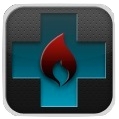 |
You’re leading the ICU round on your first day after handover. Your resident introduces the next patient … “a 63yo gentleman who’s had an out of hospital cardiac arrest yesterday. The first rythmn was VF and the the ambos shocked him 3 times, performed CPR and gave him some adrenalin. He was down for 20 minutes, with no bystander CPR for about the first 3 minutes. He came here and got cooled and he’s just being warmed up now.” Your registrar mutters to the nurse: “This guy’s not going to do well. Watch for myoclonic activity and we’ll check his pupils and motor response tomorrow.” Is your registrar correct? How and when will you prognosticate? |
[su_tabs]
[su_tab title=””]
Careful! The answers are under here :o)
[/su_tab]
[su_tab title=”Answer”]
The registrar might be correct, but right now he’s at risk of succumbing to early pessimism and subjecting the patient to a self fulfilling prophecy through early withdrawl of therapy.
In the pre therapeutic mild hypothermia (TMH) era, the 2006 American Academy of Neurology guidelines for neuroprognostication following cardiac arrest were held aloft as validated indications to withdraw therapy that was not going to lead to a meaningful patient centred outcome (Some would call this “futile therapy”, but there is a lot of controversy around this term and it might be best avoided). They include clinical tests performed at 72 hours after successful resuscitation from cardiac arrest, which meant patients, relatives and staff were not hanging about for days waiting to see if the person would wake up.
All that has changed since the introduction of TMH, following the Bernard and HACA trials in 2002. It was subsequently recognised that all of the trials that led to the generation of the 2006 AAN guidelines were performed prior to the introduction of TMH. However, it seems that these guidelines are still influencing descision processes, as shown by this recent paper in Critical Care Medicine, where clinicians were attempting to prognosticate while patients were still undergoing TMH and, in some cases, were still receiving neuromuscular blockade (the patients, not the clinicians). Work has since been done to try and validate the AAN guideline parameters for patients who recieve TMH.
A review of the state of play for neuroprognostication post cardiac arrest in the TMH era was published in The Neurologist in September 2011 and it gives a concise outline of the evidence for and against the various modalities employed. Tables 1 and 2 on page 246 are particularly helpful. In summary, for a patient who has received TMH post successful resuscitation for cardiac arrest:
- Beware of initial pessimism and being drawn into a self-fulfilling prophecy
- Absent pupillary light response at 72 hours post rewarming strongly suggests a bad neurological recovery
- An absent corneal reflex at 72 hours post rewarming also suggests a bad neurological recovery
- A motor score worse than abnormal flexion is an unreliable predictor of a bad outcome, but withdrawl or better suggests potential for a good outcome
- The occurence of myoclonic activity is also unreliable for predicting a bad outcome
- Absent N20 SSEP cortical responses at 48 hours post rewarming suggest a bad neurological recovery, but there are one or two case reports of good recovery
- An EEG showing a burst suppression pattern or status epileptiform activity suggests a bad outcome, including an EEG performed during hypothermia. However the survival and recovery figures are not uniformly 0 and the authors recommend that any epileptiform activity should be treated aggressively
- Neuron specific enolase may be useful, but as yet there are no clear recommendations on thresholds to use (abolute level or rate of rise) or when the test is best performed (somewhere between 24 and 72 hours maybe)
- Imaging techniques are being explored and MRI scores using Diffusion Weighted Imaging (DWI) and Apparent Diffusion Coefficient (ADC) may prove useful, but have not yet been validated.
There is also an ongoing debate about how soon reliable prognostication performed. There are arguments for early (about 72 hours) and delayed (5 – 8 days, or maybe more) and you can watch the S.I.N. debate on this topic from last year, where Nhi Nguyen pitted Nepean Hospital intensivists Arvind Rajamani against Ian Seppelt on just this issue here.
[/su_tab]
[su_tab title=”References”]
-
Treatment of Comatose Survivors of Out-of-Hospital Cardiac Arrest with Induced Hypothermia. Stephen A. Bernard, M.B., B.S., Timothy W. Gray, M.B., B.S., Michael D. Buist, M.B., B.S., Bruce M. Jones, M.B., B.S., William Silvester, M.B., B.S., Geoff Gutteridge, M.B., B.S., and Karen Smith, B.Sc. N Engl J Med 2002; 346:557-563February 21, 2002. Link to article.
-
Mild Therapeutic Hypothermia to Improve the Neurologic Outcome after Cardiac Arrest. The Hypothermia after Cardiac Arrest Study Group. N Engl J Med 2002; 346:549-556February 21, 2002. Link to article.
-
Timing of neuroprognostication in postcardiac arrest therapeutic hypothermia. Perman, Sarah M. MD, MS; Kirkpatrick, James N. MD, et al. Critical Care Medicine: March 2012 – Volume 40 – Issue 3 – p 719–724. Link to article.
-
Neurologic Prognosis in Cardiac Arrest Patients Treated With Therapeutic Hypothermia. Nicholas A. Blondin, MD and David M. Greer, MD, MA, FCCP. The Neurologist 2011;17:241–248. Link to article.
[/su_tab]
[/su_tabs]
























